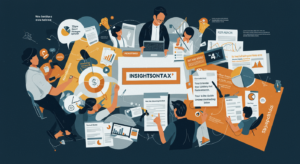Open Banking: How Sharing Your Data is Changing Finance Forever
Ever felt like your bank accounts were locked away in separate vaults, making it tricky to get a clear picture of your finances? Or wished managing your money across different apps was simpler? Well, buckle up, because there’s a seismic shift happening in the world of financial services, and it’s called Open Banking. It might sound technical, but its impact is all about putting you more in control of your financial life. Let's dive in!
So, What Exactly Is Open Banking?
At its heart, Open Banking is a simple concept with powerful implications. It’s a secure way for you to allow banks and other financial service providers (often innovative Fintech companies) to share your financial data, but only with your explicit permission.
Think of it like this: You use your Google or Facebook account to log into other apps, right? You grant permission for that app to access specific profile information. Open Banking works similarly but for your financial data.
How does it happen? Through something called APIs (Application Programming Interfaces). These are like secure digital messengers that allow different software systems to talk to each other safely. Regulations, like the Payment Services Directive (PSD2) in Europe and similar initiatives worldwide, mandate that banks build these secure APIs, paving the way for this new era of data sharing.
Key takeaways:
- It’s about securely sharing your financial data.
- You are always in control and must give explicit consent.
- It uses secure technology (APIs) regulated by authorities.
- It opens the door for new and innovative financial services.
How Open Banking is Shaking Up Financial Services
Open Banking isn't just a background technical change; it's actively reshaping the financial landscape for consumers and businesses alike. Here’s how:
A Turbo Boost for Customer Experience
Remember juggling multiple banking apps just to see your balances? Open Banking is making that a thing of the past.
- All Your Finances in One Place: Imagine a single dashboard showing your current accounts, savings, credit cards – even from different banks! Many budgeting and personal finance apps now use Open Banking to provide this holistic view.
- Truly Personalised Advice: By allowing access to your transaction history (with your consent!), apps can offer tailored budgeting tips, suggest better savings accounts, or identify potential loan options that genuinely fit your financial situation. This enhances the customer experience dramatically.
- Smoother Payments: Initiating payments directly from third-party apps becomes seamless and secure, bypassing clunky card entry or traditional bank transfer processes.
- Easier Switching: Comparing products and switching providers becomes much simpler when your data can be easily (and securely) shared with potential new providers.
Fuelling Fintech Innovation
Open Banking has been a massive catalyst for innovation in the financial technology (Fintech) sector.
- Lowering Barriers: Fintech startups no longer need to build everything from scratch or navigate complex individual bank partnerships. Access to standardized APIs allows them to focus on creating valuable services for users.
- New Services Galore: This has led to an explosion of new tools: smart budgeting apps, automated savings platforms, innovative lending solutions, and niche financial management tools for freelancers or small businesses.
- Collaboration is Key: We're seeing more partnerships between traditional banks and agile Fintechs. Banks provide the secure infrastructure and trust, while Fintechs bring cutting-edge technology and user-centric design. It’s a win-win driving the digital transformation of finance.
Increased Competition and Choice
When data flows more freely (securely, of course!), competition naturally heats up.
- Keeping Banks on Their Toes: Traditional banks can no longer rely solely on customer inertia. They need to innovate, improve their offerings, and provide better value to retain customers.
- More Options for Everyone: Consumers and businesses benefit from a wider array of financial products and services, often more tailored and competitively priced than traditional offerings.
Streamlining Business Operations
It's not just personal finance; businesses are reaping the rewards too.
- Simplified Accounting: Accounting software can directly and securely pull bank transaction data, significantly reducing manual data entry and errors.
- Better Lending Decisions: Lenders can get a real-time, comprehensive view of a business's financial health, leading to faster and potentially fairer credit decisions.
- Improved Payment Processing: Open Banking enables smoother, faster, and often cheaper payment initiation for merchants.
Addressing the Concerns: Security and Privacy
Understandably, the idea of sharing financial data raises questions about security and privacy. These concerns are paramount, and the Open Banking framework is built with them in mind.
- Consent is King: Nothing happens without your explicit permission. You choose who accesses your data, what data they can see, and for how long. You can revoke access at any time.
- Bank-Grade Security: All data sharing happens through the same secure, encrypted channels your bank uses for its own online banking and apps.
- Strict Regulation: Financial authorities heavily regulate companies that use Open Banking APIs. They must adhere to stringent security standards and data protection laws (like GDPR).
Think of it like giving a specific key for a specific room, not the keys to your entire house. You control the access.
The Future is Open: What's Next?
Open Banking is just the beginning. The next evolution is often called "Open Finance," extending the principles beyond just payment accounts.
- Expanding Scope: Imagine securely sharing data related to your savings, investments, mortgages, pensions, and even insurance through similar APIs. This will unlock even more holistic financial management and hyper-personalized advice.
- Global Momentum: While pioneering regions like the UK and EU led the way, Open Banking initiatives are gaining traction globally, adapting to local regulations and market needs.
- Deeper Integration: We'll likely see Open Banking principles integrated even more deeply into our daily lives, powering invisible payments, seamless financial check-ups within other apps, and much more innovation.
Embracing the Open Banking Revolution
Open Banking represents a fundamental shift in financial services. It moves away from siloed data towards a more connected, transparent, and customer-centric ecosystem. It empowers individuals and businesses with greater control over their financial data, fuels Fintech innovation, increases competition, and ultimately leads to better products and a superior customer experience. While security and privacy remain crucial considerations, the robust regulatory and technological frameworks provide strong safeguards. The future of finance is undeniably open.
Ready to see what Open Banking can do for you? Explore some of the popular budgeting or financial management apps that leverage this technology and experience the benefits firsthand!


